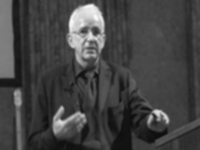Keynote Speakers - Karl Grammer
 Karl Grammer
Karl Grammer
Ludwig Boltzmann Institute for Urban Ethology
Austria
Analogue Communication and the Emergence of Meaning
Abstract
In the last twenty years of research we have tried to establish a behavioral repertoire of human communication on the bases of traditional coding with behavior categories. This research was basically unsuccessful, and we realized that:
- the meaning of signals seems to depend from too many variables,
- signals show high inter- and intraindividual variation,
- one signal can be substituted by another signal,
- signal combinations and combinations of combinations are possible,
- signals can be used independent from context,
- non-verbal behavior seems to be highly probabilistic,
- non-verbal behavior is norm-governed in different cultures, and
- the same category of behavior can be displayed qualitatively different.
These facts lead to an "atomizing effect" in behavior categories - for an exact description and a complete repertoire coverage the categories will become smaller and smaller until every single performed behaviour has its own category. In addition to these problems traditional coding has to apply information reduction in order to be feasible. Pattern recognition in behavior is only possible by adding a "world model" or "a priori" knowledge to the behavior. Thus, observing with defined behavior categories is already a data reduction, and it seems likely that the information put in the construction of a behavior definition is highly biased in favor of the research question.
In this talk I we will try to explore the relation between recent findings which indicate that communication is independent from human categorical perception (i.e. analogue communication). Humans probably have a communication system that allows them to share other humans emotions, personality and other internal states directly without cognitive access. If this is the case we basically have to rewrite communication theories and redefine the cognitive processes which take place during communication.
Biography
- 1972-1979: Diplom-Studium (M.S.) in Zoology with Anthropology and Physics at the University of Munich.
- 1979-1982: Dissertation (Ph.D.), Title: Wettbewerb und Kooperation: Das Eingreifen in Konflikte unter Kindergartenkindern (Competition and Cooperation: intervention in conflict among preschool children), University of Munich.
- 1983: Assistant Professor: Max-Planck-Institute für Verhaltensphysiologie- Forschungsstelle für Humanethologie.
- 1991: Scientific (together with Prof.Dr.I.Eibl-Eibesfeldt) and administrative director of the Ludwig-Boltzmann-Institute for Urban Ethology in Vienna
- 1994: JSPS Fellowship at the University of Kyoto / Dept. of Zoology
- 2002: Zdenek-Klein Award for integrative research
- 2004: First Prize in the call Co Operate 2003 of the WWFF for development of innovative non-verbal behavior simulation software
- 2004-2005: Research fellow at the Centre of Interdisciplinary Research in Bielefeld (ZIF) (Germany)
- 2009: Senior scientist Department of Anthropology - Human Behavior Research (University of Vienna)
